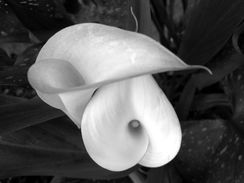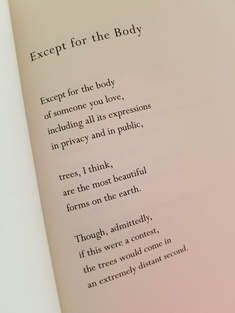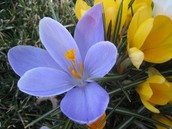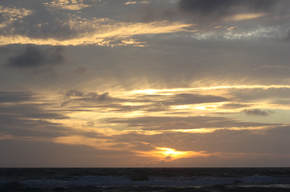 I taught seventh grade forever, it seems, and when I was allowed, I squeezed in poetry as much as possible. I can recall standing in front of some rather unenthused faces trying to convince them of the wonders of Evelyn Tooley Hunt's poem, "Mama is a Sunrise." It was one of the few poems that appeared in our anthology. In those days, we talked about the strategies of craft, but I wanted so much for them to see the simple delicacy of the choice of each word and line in this poem. As a teacher in a junior high, I did a lot of dancing, trying to infuse students' lukewarm bodies with new energy. Mama is a Sunrise When she comes slip-footing through the door, she kindles us like lump coal lighted, and we wake up glowing. She puts a spark even in Papa's eyes and turns out all our darkness. When she comes sweet-talking in the room, she warms us like grits and gravy and we rise up shining. Even at night-time Mama is a sunrise that promises tomorrow and tomorrow. In doing a bit of research, I realize that Hunt, who also wrote as Tao-Li, was famous for writing the poem "Taught Me Purple," the poem which inspired the novel The Color Purple by Alice Walker. Taught Me Purple My mother taught me purple Although she never wore it. Wash-grey was her circle, The tenement her orbit. My mother taught me golden And held me up to see it, Above the broken moldings, Beyond the filthy street. My mother reached for beauty And for its lack she died, Who knew so much of duty She could not teach me pride. According to some sources I read, she liked to write about other cultures, and clearly from the use of her pen name, Tao-Li, she took that seriously. I am reminded of the "scandal" in 2015 when Michael Derrick Hudson's poem was published in The Best American Poetry volume under the name Yi-Fen Chou. www.theguardian.com/books/2015/sep/08/white-poet-chinese-pen-name-best-american-poetry-2015 I admire Alexie's comments. You may remember that Sherman Alexie was the guest editor, and he defended Hudson's choice. Evidently Hudson had submitted the poem 40 times under his real name and had it rejected numerous times before he submitted under the pen name. Alexie stated that he certainly did not like the subterfuge, but Alexie adds, "Rereading 'The Bees, the Flowers, Jesus, Ancient Tigers, Poseidon, Adam and Eve' with the knowledge of Hudson’s true identity made it no less compelling . . . “most important, it didn’t contain any overt or covert Chinese influences or identity. I hadn’t been fooled by its ‘Chinese-ness’ because it contained nothing that I recognized as being inherently Chinese or Asian.” Alexie is a Native American and he " admitted that he had been “more amenable to the poem because I thought the author was Chinese American”, saying that there are “many examples of white nepotism inside the literary community”, and that he was “also practicing a form of nepotism. I am a brown-skinned poet who gave a better chance to another supposed brown-skinned poet because of our brownness.”" Evelyn Tooley Hunt was a white poet who took on pen name,, and published under that name, AND who reportedly influenced the writing of Alice Walker's novel, The Color Purple (and subsequently the acclaimed motion picture of the same name) about brown-skinned people. Note: Nowhere did I find a reference to the poem in researching Walker's novel. That info was a part of Hunt's bio. Clearly, Hunt did not receive the acclaim/attack/flack that Hudson did, but both situations raise some eyebrows. Why did both Hunt and Hudson feel so compelled to write using pen names with a distinctly different cultural origin? The whole question of nepotism that Alexie mentions intrigues me as well. As an associate editor of the Rhino Poetry journal, it's hard to ignore the name used to submit a group of poems. Sometimes one or more of the editors knows the poet, sometimes, the poet is "famous" by whatever standards one uses, and often an ethnicity is suggested by the name. Is an unbiased reading possible? I leave that for you to answer. Personal preferences obviously plays= a role in what we read, in what we like, but I don't know how a truly unbiased reading takes place. There's a whole mix of what makes a poem "good" and it's likely more than "good bones," to borrow the title of Maggie Smith Beehler's stellar poem and book. True "blind readings" are hard to do in our information-saturated world. I do know that I wanted my students to love poetry, to love the bones in Hunt's/Tao-Li's "Mama is a Sunrise," a poem which I can still remember pitching to twelve-year-olds twenty or more years later For sure. And truthfully, my "mama" was a sunrise. And I do know, as a reader and writer of poetry today, it's often hard to separate the "bones" from the poet.
3 Comments
I wrote a poem this week that I submitted to Rattle's Poets Respond. It wasn't selected for publication, but I feel compelled to put this out there. There really are no words adequate to describe what transpired over so many years to so many trusting innocent girls.
With my submission: I am sickened by the testimonies of over a hundred women in the week-long victim impact sentencing hearing, by the audacity and depravity of the sports doctor, Larry Nassar, and the failure of many to respond to the young athletes in the story coming out of Michigan. I kept scrolling past the live feed on Facebook, but I could only stomach listening for short periods of time. If ever those who have been abused and come forward needed a voice and an ear like Judge Aquilina, it is now. Of course, there are those who criticized her for her actions including when she suggests that an eye-for-an-eye punishment might be fitting, but her capacity to respond to each person uniquely with empathy and encouragement was amazing, and if the survivors need to remember the sincerity of her words as they spend years recovering from Nassar's actions, they are forever archived. Poem: Poetic Justice Leave your pain here, says Judge Rosemarie Aquilina, a hint of cowboy boots under her robes. Her resolve to hear the unmanicured truth makes me want to glue myself to her side, nod with her as she telegraphs empathy and outrage to each sister in this battalion of survivor warriors. I want to witness with her as their faces weep or pale, to rock them close to my ribcage, then straighten the curve of their weighted spine-- reassure as they scratch at scabby doubts, and remove the voice’s catch, like a staple hung up in the throat, as they stand emboldened by numbers to speak the horrors of their metoo. Let their voices blister the ears of all complicit. And when I peel myself from the judge’s side, I want to let her counsel settle in my own sister-cells, Leave your pain here, and go out and do your magnificent things. 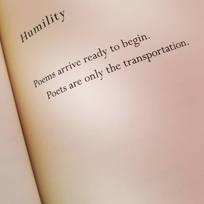 On New Year’s Day, I listened to an ON BEING podcast of a rare interview of Mary Oliver by Krista Tippett which took place on October 5, 2015 in Florida where Oliver now lives. Mary Oliver is certainly a poet I return to frequently, partly I think because of her attachment to the natural world which I share. Oliver talks briefly but in generalities about her home which was difficult at best and relates that when she was a child, she often left school to simply walk in the woods, to listen deeply. She calls it "listening convivially." This intrigues me, but I find myself doing this listening more often when I have my camera tucked in my hand, even in the coldest weather. Recently I needed a mental boost, and I found myself at the Chicago Botanic Garden; it was a cold day, and in the ninety minutes or so that I was there, maybe I passed three other people, all of whom seemed equally happy to be inhabiting this space of winter Midwest browns and silhouettes alone. I often use nature imagery in my poetry,, but it’s generally generated for me by “seeing convivially.” Oliver states that she “. . . did find the entire world in looking for something. But I got saved by poetry. And I got saved by the beauty of the world.” I can identify with that in every part of my being. In 2004 several years before I retired from teaching and found myself pursuing poetry more passionately and with much more attention to craft, I wrote these lines: Some days / I am even/ saved by / beauty. Every minute part of nature, and particularly the botanical part of nature, draws me in. One photograph, just one, that pleases me to the point of elation is enough to change the tenor of the entire day for me. I commented to a friend just this week that when I go to the Chicago Botanic Garden to I can feel even my breathing change, the tightness in my chest and shoulders loosen within minutes--I am being saved. That idea of the single serendipitous photographic moment dovetails with another part of the conversation that Oliver and Tippett had which is about poems that just come to us. So rare. Poems that we write where we never need to change a single word. Oliver says, and I agree, "But they do happen. It does — I have very rarely, maybe four or five times in my life, I’ve written a poem that I never changed. And I don’t know where it came from. But it does happen. But it happens among hundreds of poems that you’ve struggled over.” The words for me come later or else I draw upon a visual image I've recorded with the camera, and I can feel equally exhilarated when something works on the page. It's rare when there's unedited magic, but when it happens, it's glorious! Yesterday I read Oliver’s book, Felicity. A quick reading, and the "Humility" poem jumped out. I like the idea of thinking of myself as transportation, as a vehicle. An Uber driver for poems, for poetry. And one more playful poem in this collection that fits with my love of trees . . . and humans. 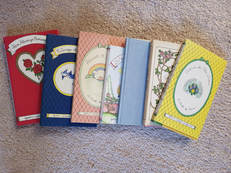 Rupi Kaur, a Punjabi-Canadian poet, came on my radar recently--reading about her, hearing about her from friends. was spurred to purchase her books just to know more about Rupi Kaur, poet phenomenon. [I still prefer the books to the free Kindle versions, and I think someone should invent “space bags” for books--a topic for another blog]. I knew that Kaur self-published her first book before a publisher, Andrews McMeel Publishing, picked up the first one, and now her second book is out. Based on an article published in The New York Times on October 5, her first book, “Milk and Honey” has sold 2.5 million copies worldwide and has been translated into 25 languages. Over the last two years, it has spent 77 weeks on The New York Times Trade Paperback Best-Seller List. Her second book, “The Sun and Her Flowers,” was released this week and is No. 2 on Amazon’s best-seller list.” At the age of 25, she has “spoken” to millions of people via Instagram where she has nearly two million followers. The same article mentions the 1000, and yes, that’s three zeroes, people who showed up for a reading that month. That’s something few poets dream of in 2018. She has been broadly criticized for two things: plagiarism and for not writing “real” poetry. According to a Buzzfeed article, August 4, 2017, “The Problem With Rupi Kaur's Poetry,” her work is similar in style particulary to Nayyirah Waheed and Warsan Shire. Some have gone so far as to post Waheed's poems side by side with Kaur's to make the point. As you might imagine, commenters differed on the issue. Her free verse form is loose and lacking in the “traditional craft” of poetry. She’s also been blasted for many choices she’s made including the similarity of her writing to others, capitalizing on social media, classifying her writing as “the story of a young brown woman” to gain traction, and being “disingenuous” by exploiting the stories of other women who have experienced the personal traumas and emotions about which she writes. She defends herself on all points. I guess I admire her oomph. She moves boldly in the world. Maybe someday she’ll look back and question her choices, but almost instant fame is fraught with regret or missteps. What she says speaks equally to the anxieties of Golden Globe red-carpeters that flash on the screenfor their 15 seconds of fame and to the 12-year-old that sat in my classroom, downcast, and then later cut herself in the school bathroom or at home at night. From the sun and her flowers i reduced my body to aesthetics forgot the work it did to keep me alive with every beat and breath declared it a grand failure for not looking like theirs searched everywhere for a miracle foolish enough to not realize I was already living in one Her writing spins me back to the time when, at her age, I was collecting books and copying sayings in notebooks that sparked a bit of truth for me. Odd choices, maybe, but Kahlil Gibran’s The Prophet comes to mind. It still sits on my shelf, and my mother asked for a passage from it to be read at her memorial service. I have another collection of books I will not part with—small books of “poems” with just a few lines on a page written by Joan Walsh Anglund. I could go back to any one of her books and be moved by what on first glance may seem insubstantial. And yet . . . “The Past writes with indelible ink. We cannot erase her story", or "In War . . . or Peace, . . . the wrens still build their nests," both poems from her book Crocus in the Snow. Undoubtedly there were those who did not call those "poems." Have others said the same before and maybe more expansively and been subsequently recognized? Surely, but I find these word droplets still sing for me. I will posit that is the imagery that works for me best I have a sense that the same will be true for readers of Rupi Kaur years down the road, her words giving voice to the long-ignored emotions and thoughts of women about body and status in the world. Another theme of hers is empowerment. Is the time in which Kaur writes ripe for what she has to say? Yes. Is what she writes and posts raw? Yes. Is it resonating with people of all color who line up at public venues to hear her read (as many as 1000 at a time)? Yes. We choose our “heroes,” the “voices” we carry with us, and if Kaur’s poetic voice speaks to many, I find no need to be a critic. Right now is "her time", and it's a time for this kind of vibrancy on this planet! Links to more info about Rupi Kaur PBS interview The Guardian |
Archives
March 2021
The Revival Tour
Poet Bloggers 2018 Kelli Russell Agodon- http://ofkells.blogspot.com/ Donna Vorreyer – https://djvorreyer.wordpress.com Beth Adams – http://www.cassandrapages.com Sandra Beasley – http://sbeasley.blogspot.com Carolee Bennett – https://gooduniversenextdoor.com/ Mary Biddinger – wordcage.blogspot.com/ Andrea Blythe – http://www.andreablythe.com Dave Bonta – http://vianegativa.us Jim Brock -- http://picturesthatgotsmall.blogspot.com James Brush http://coyotemercury.com Angela T Carr https://angelatcarr.wordpress.com/ Grant Clauser http://www.uniambic.com Kevin Connor – https://ordinaryaveragethoughts.wordpress.com/ Jared Conti – http://www.theoracularbeard.com Jill Crammond https://jillypoet.wordpress.com/ Jenelle D’Alessandro – http://www.borderandgreetme.com Laura E. Davis – http://www.dearouterspace.com/ Kate Debolt – http://www.katedebolt.net/blog/ Heather Derr-Smith – ferhext.com/ Risa Denenberg – https://risadenenberg.weebly.com/blog Cynthia Schwartzberg Edlow http://cschwartzbergedlow.blogspot.com Andrew Eickstead http://www.unleashingthewordhoard.com Lou Faber – https://anoldwriter.com Jeannine Hall Gailey – webbish6.com Gail Goepfert –In the Mix gailgoepfert..com/blog Erica Goss http://ericagoss.com Sarah Kain Gutowski – mimsyandoutgrabe.blogspot.com Erin Hollowell – http://www.beingpoetry.net . T Trish Hopkinson https://trishhopkinson.com/ Jennifer Hudgens https://jenniferelhudgens.wordpress.com Catherine Hume : https://catherinehume.wordpress.com/ Crystal Ignatowski – http://somehiatus.tumblr.com/ Charles Jensen – https://charles-jensen.com/kinemapoetics-blog/ JJS https://thisembodiedcondition.wordpress.com Jill McCabe Johnson http://jillmccabejohnson.com/blog-chanson-daventure.html Collin Kelley http://www.collinkelley.blogspot.com Kathleen Kirk https://kathleenkirkpoetry.blogspot.com/ Anita Olivia Koester https://www.forkandpage.com/ Lakshmi – thiswinterheart.tumblr.com Courtney LeBlanc – wordperv.com Lorena P Matejowsky https://nothingbutblueskies.wordpress.com/ Marilyn McCabe O Write.MarilynonaRoll.wordpress.com Ann Michael – www.annemichael.wordpress.com Amy Miller – http://writers-island.blogspot.com/ James Moore – jameswmoore.wordpress.com LouAnn Sheperd Muhm – https://louannmuhm.com/ January Gill O’Neill – http://poetmom.blogspot.com Shawnte Orion http://batteredhive.blogspot.com/ Ren Powell http://renpowell.com/blog/ Bethany Reid http://www.bethanyareid.com/ Susan Rich – http://thealchemistskitchen.blogspot.com . Lee Ann Roripaugh https://runningbrush.wordpress.com/ Sarah Russell – https://sarahrussellpoetry.net Martha Silano : http://bluepositive.blogspot.com/ Kim Bailey Spradlin – www.kimbaileydeal.net Bonnie Staiger –https://bonniestaiger.com/ Rosemary Starace https://thresholdview.wordpress.com/ Hannah Stephenson – http://thestorialist.com Stephanie Lane Sutton athenasleepsin.wordpress.com Christine Swint – https://balancedonedge.blog/ Dylan Tweney – http://dylan20.tumblr.com/ Michael Allyn Wells: http://stickpoetsuperhero.blogspot.com/ Allyson Whipple http://allysonmwhipple.com |
